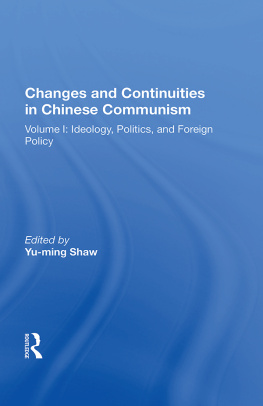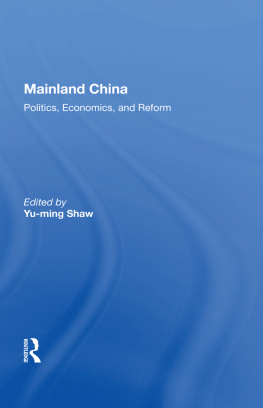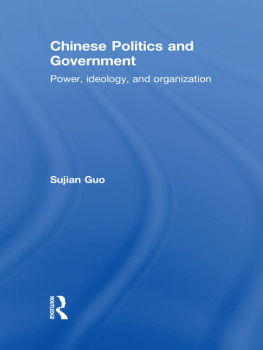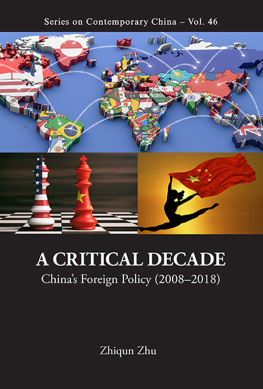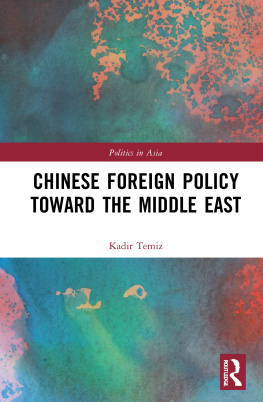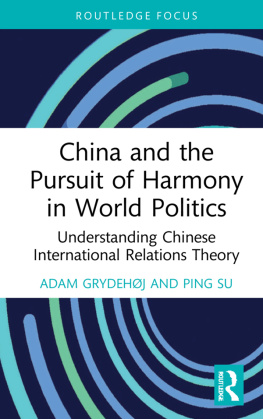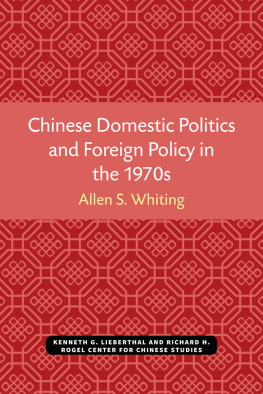Changes and Continuities in Chinese Communism
Volume I: Ideology, Politics, and Foreign Policy
Published in cooperation with the Institute of International Relations, Taipei, Taiwan, Republic of China
First published 1988 by Westview Press
Published 2018 by Routledge
52 Vanderbilt Avenue, New York, NY 10017
2 Park Square, Milton Park, Abingdon, Oxon OX14 4RN
Routledge is an imprint of the Taylor & Francis Group, an informa business
Copyright 1988 by Taylor & Francis
All rights reserved. No part of this book may be reprinted or reproduced or utilised in any form or by any electronic, mechanical, or other means, now known or hereafter invented, including photocopying and recording, or in any information storage or retrieval system, without permission in writing from the publishers.
Notice:
Product or corporate names may be trademarks or registered trademarks, and are used only for identification and explanation without intent to infringe.
Library of Congress Cataloging-in-Publication Data
Changes and continuities in Chinese communism.
Contents: v. 1. Ideology, politics, and foreign
policyv. 2. The economy, society, and technology.
1. CommunismChinaHistory. 2. ChinaPolitics
and government1949 . 3. ChinaSocial
conditions1976 . I. Shaw, Yu-ming.
HX418.5.C473 1988 951.05 87-15928
ISBN 0-8133-7411-1 (v. 1)
ISBN 0-8133-7423-5 (v. 2)
ISBN 13: 978-0-367-01398-1 (hbk)
1
How Can We Evaluate Communist Chinas Political System Performance?
Alan P.L. Liu
For quite some time and, to a certain extent, even at present in American scholarly circles, evaluation of the performance of the Chinese Communist political system has been everybodys utopia. Some U.S. China specialists, before the availability of reliable information, had reached the firm verdict that the Maoist model had opened a new path to development and that both developing and developed nations ought to learn from it.
These obviously false and even absurd notions about mainland China call forth a serious evaluation of the performance of the Communist political system since its inception in 1950. A second reason for making such an evaluation is that the present leaders on mainland China themselves have sought to sum up their experience of the first thirty years in order to learn from the past and embark on a new path of national development. Indeed those starry-eyed writers in the West concerning the PRC might well benefit from a reading of the Communist Partys own evaluation of the Mao era. A third reason for a scholarly evaluation of the mainland Chinese political system is to provide a reference framework for an assessment of the reform measures that post-Mao leaders have carried out since 1979.
To evaluate the performance of the Chinese Communist Party (CCP), I shall combine a number of concepts that have been suggested by scholars in comparative politics for evaluating the performance of a government. The main framework that I rely on is the three-dimension scheme on the productivity of political systems developed by Almond and Powell, Moreover, an evaluation of any political system will not be complete if we do not take into account what the founders or leaders of a particular political system set out to do. To put it bluntly, we must hold leaders accountable to their promises. Subsequent analysis will combine all these references, though the scheme by Almond and Powell serves as the main frame.
System Goods
In evaluating the performance of a political system, Almond and Powell make use of the concept of political goods suggested by Pennock. Political goods, according to Pennock, refer to the consequences of outputsconsequences for the people, for the society as a whole, or for some subset other than the polity, as, for instance, the economy or the family. Whereas Pennocks political goods seem to be specifically related to public policy,
Table 1.1 The Productivity of Political Systems
Classes of Political Goods
|
| Domestic Goods
| International Goods
|
|
| System goods | System maintenance | Regularity and predictability of processes and content | Regularity and preditability in international interaction |
| System adaptation | Structural and cultural adaptability in response to domestic environmental challenges and opportunities | Structural and cultural adaptability in response to international environmental challenges and opportunities |
| Process goods | Participation | Instrumental activity for domestic outputs | Instrumental activity for foreign outputs |
| Activity directly productive of sense of efficacy and dignity | Activity directly productive of sense of efficacy and cignity through patriotic or international input |
| Compliance and support | Instrumental (sanctionavoiding) compliance with law | Instrumental (sanctionavoiding) performance of military and other foreign duties |
| Fulfillment of duty, opportunities for service, achievement | Opportunities for patriotic service and/or international service |
| Procedural justice | Equality before the law | Respect for international law and procedure |
| Equitable procedure | Encouragement of procedural justice abroad |
| Policy goods | Welfare | Growth per capita; quantity and composition | Growth; creation of externalities |
| Distributive equity | Distributibve equity; facilitation of trade, growth, and welfare abroad |
| Security | Safety of person and property | National security |
| Public order | Contribution to international conflict resolution |
| Liberty | Freedom from regulation | Respect for the autonomy of other nations |
| Protection of privacy | Encouragement of domestic liberty abroad |
Source : Adapted from Almond and Powell, Comparative Politics , 398.
To sum up, the first type of political goods that a political system must produce is system goods, which consist of system maintenance and adaptation. Specifically, we must evaluate a polity in terms of (1) its capacity to change structure and performance in order to cope more effectively with environmental challenges and opportunities, (2) the achievement of the foregoing with efficiency, that is, a favorable relationship between benefits and costs, and (3) a sense of regular order and constructive responses to challenge. Almond and Powell regard the last taskregularity and constructive response to challengeas the direct consumer goods produced by a political system: The sense that things are in their proper place on earth and in heaven may be a direct output to consumers. The world acquires a familiar structure and process to which people can adaptthe social orders, ranks, and role incumbents behave appropriately. Interruptions and serious deviations in these routines and behaviors create uneasiness and arouse anxiety; there is a decline in the productivity of orderliness.

